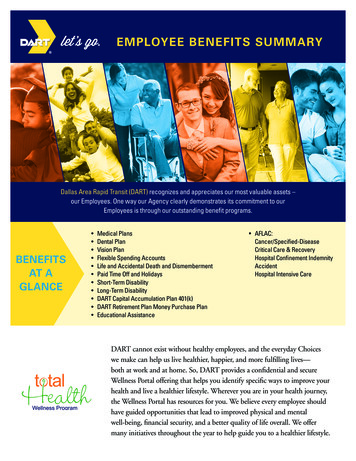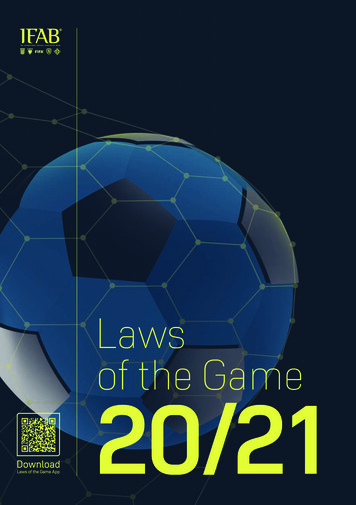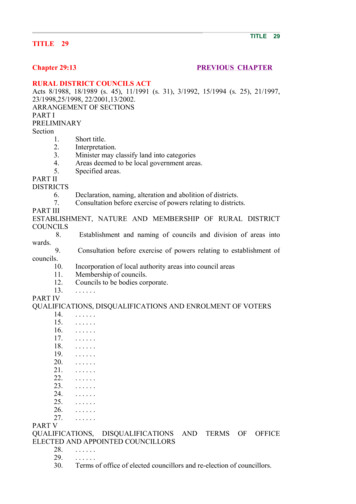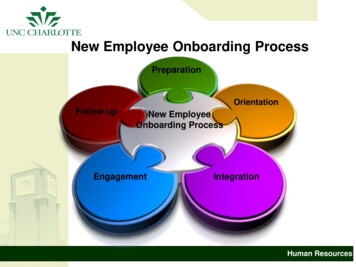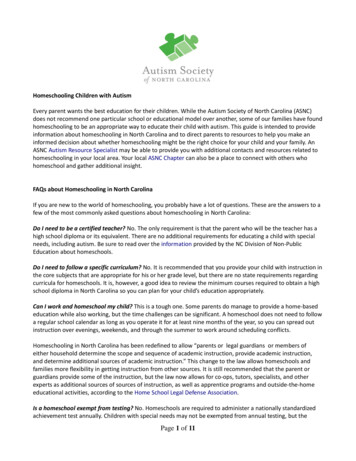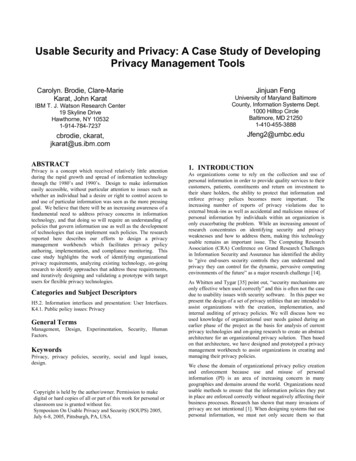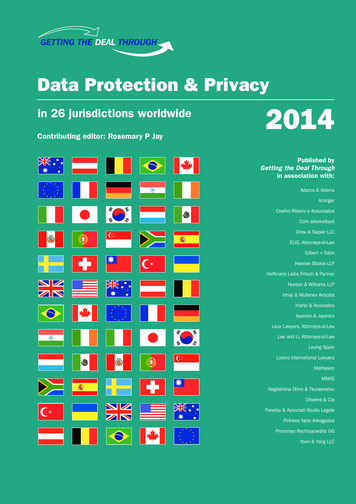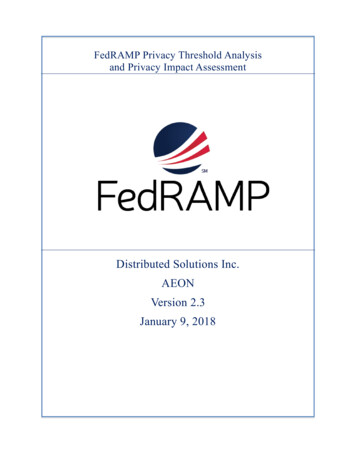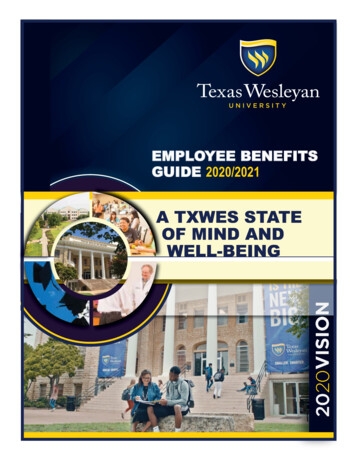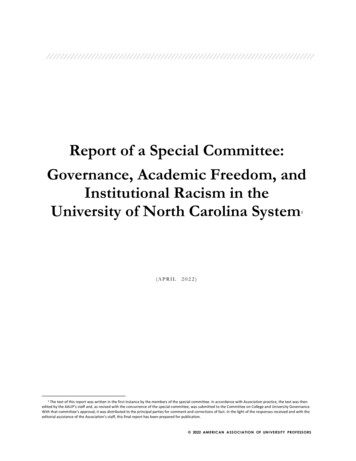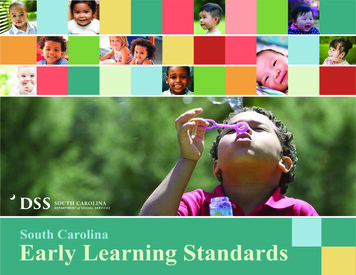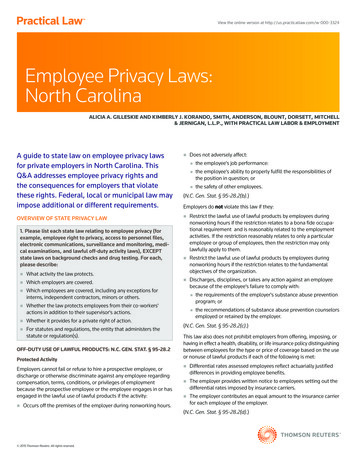
Transcription
View the online version at http://us.practicallaw.com/w-000-3324Employee Privacy Laws:North CarolinaALICIA A. GILLESKIE AND KIMBERLY J. KORANDO, SMITH, ANDERSON, BLOUNT, DORSETT, MITCHELL& JERNIGAN, L.L.P., WITH PRACTICAL LAW LABOR & EMPLOYMENTA guide to state law on employee privacy lawsfor private employers in North Carolina. ThisQ&A addresses employee privacy rights andthe consequences for employers that violatethese rights. Federal, local or municipal law mayimpose additional or different requirements.OVERVIEW OF STATE PRIVACY LAW1. Please list each state law relating to employee privacy (forexample, employee right to privacy, access to personnel files,electronic communications, surveillance and monitoring, medical examinations, and lawful off-duty activity laws), EXCEPTstate laws on background checks and drug testing. For each,please describe: What activity the law protects. Which employers are covered. Which employees are covered, including any exceptions forinterns, independent contractors, minors or others. Whether the law protects employees from their co-workers'actions in addition to their supervisor's actions. Whether it provides for a private right of action. For statutes and regulations, the entity that administers thestatute or regulation(s).OFF-DUTY USE OF LAWFUL PRODUCTS: N.C. GEN. STAT. § 95-28.2Protected ActivityEmployers cannot fail or refuse to hire a prospective employee, ordischarge or otherwise discriminate against any employee regardingcompensation, terms, conditions, or privileges of employmentbecause the prospective employee or the employee engages in or hasengaged in the lawful use of lawful products if the activity: Occurs off the premises of the employer during nonworking hours. 2015 Thomson Reuters. All rights reserved. Does not adversely affect: theemployee's job performance: theemployee's ability to properly fulfill the responsibilities ofthe position in question; or thesafety of other employees.(N.C. Gen. Stat. § 95-28.2(b).)Employers do not violate this law if they: Restrict the lawful use of lawful products by employees duringnonworking hours if the restriction relates to a bona fide occupational requirement and is reasonably related to the employmentactivities. If the restriction reasonably relates to only a particularemployee or group of employees, then the restriction may onlylawfully apply to them. Restrict the lawful use of lawful products by employees duringnonworking hours if the restriction relates to the fundamentalobjectives of the organization. Discharges, disciplines, or takes any action against an employeebecause of the employee's failure to comply with: therequirements of the employer's substance abuse preventionprogram; or therecommendations of substance abuse prevention counselorsemployed or retained by the employer.(N.C. Gen. Stat. § 95-28.2(c).)This law also does not prohibit employers from offering, imposing, orhaving in effect a health, disability, or life insurance policy distinguishingbetween employees for the type or price of coverage based on the useor nonuse of lawful products if each of the following is met: Differential rates assessed employees reflect actuarially justifieddifferences in providing employee benefits. The employer provides written notice to employees setting out thedifferential rates imposed by insurance carriers. The employer contributes an equal amount to the insurance carrierfor each employee of the employer.(N.C. Gen. Stat. § 95-28.2(d).)
Employee Privacy Laws: North CarolinaCovered Employers The reason for a former employee's separation.The law covers private employers with three or more regularly employed employees (N.C. Gen. Stat. § 95-28.2(a)).(N.C. Gen. Stat. § 1-539.12(b).)Covered EmployeesThe law covers all employees and prospective employees.Co-workers ViolationsThe law does not address co-worker violations.Private Right of ActionAn employee who is discharged or otherwise discriminated against,or a prospective employee who is denied employment in violation ofthis law, may bring a civil action within one year from the date of thealleged violation against the employer seeking any of the following: Any wages or benefits lost as a result of the violation. An order of reinstatement without loss of position, seniority orbenefits. An order directing the employer to offer employment to theprospective employee.(N.C. Gen. Stat. § 95-28.2(e).)The court may award reasonable costs, including court costs andattorneys' fees, to the prevailing party in an action brought under thelaw (N.C. Gen. Stat. § 95-28.2(f)).AdministrationThere is no administering agency.IMMUNITY FROM CIVIL LIABILITY FOR EMPLOYERS DISCLOSINGINFORMATION: N.C. GEN. STAT. § 1-539.12Protected ActivityEmployers that disclose information about a current or formeremployee's job history or job performance to the employee's prospective employer on request of either the prospective employer or theemployee are: Immune from civil liability. Not liable in civil damages for the disclosure or any consequencesof the disclosure.(N.C. Gen. Stat. § 1-539.12(a).)Immunity does not apply when a claimant shows by a preponderanceof the evidence both of the following: The information disclosed by the current or former employer was false. The employer providing the information knew or reasonably shouldhave known that the information was false.(N.C. Gen. Stat. § 1-539.12(a)(1), (2).)"Job performance" includes: The employee's suitability for re-employment.Covered EmployersThe law covers all employers, including any employee, agent, or otherrepresentative of the employer who is authorized to provide and whoprovides information under the law.Generally, job placement services are covered but not: Private personnel services as defined in Section 95-47.1 of the NorthCarolina General Statutes. Job listing services as defined in Section 95-47.19 of the NorthCarolina General Statutes.However, the law applies to private personnel services and job listingservices only to the extent that the service: Conveys information derived from: creditreports; courtrecords; educationalrecords; and informationfurnished to it by the employee or prior employers. Identifies the source of the information.(N.C. Gen. Stat. § 1-539.12(c).)Covered EmployeesThe law covers all current or former employees.Co-workers ViolationsImmunity is available to any employee, agent, or other representativeof the current or former employer who is authorized to provide andwho provides information according to the provisions of the law (N.C.Gen. Stat. § 1-539.12(c)).Private Right of ActionThe law provides civil immunity to liability for claims brought by employees or former employees against the employer for disclosing jobhistory or job performance information, or both. It does not providefor a private right of action.AdministrationThere is no administering agency.PERSONS WITH DISABILITIES PROTECTION ACT: N.C. GEN. STAT. §168A-5Protected ActivityEmployers and employment agencies cannot require an applicantto identify himself as a person with a disability before a conditionaloffer of employment. However, any employer may invite an applicantto self-identify as a person with a disability to act affirmatively on theapplicant's behalf. (N.C. Gen. Stat. § 168A-5(a)(4).) The employee's skills, abilities, and traits as they may relate tosuitability for future employment.2 2015 Thomson Reuters. All rights reserved.
Employee Privacy Laws: North CarolinaEmployers may, among other things: Inquire whether a person has the ability to perform the duties ofthe job in question. Require or request a person to undergo a medical examination,including a medical history, to determine the person's ability orcapacity to safely and satisfactorily perform the duties of availablejobs for which the person is otherwise qualified, or to aid indetermining possible accommodations for a disabling condition,provided that: anoffer of employment has been made on the condition that theperson meets the physical and mental requirements of the jobwith or without reasonable accommodation; and the examination is required of all persons conditionally offeredemployment for the same position regardless of disabling condition,unless the examination is limited to determining the extent to whicha person's disabling condition would interfere with his ability orcapacity to safely and satisfactorily perform the duties of the job inquestion or the possible accommodations for a disabling condition. Obtain medical information or require or request a medical exami-nation where such information or examination is to establish anemployee health record. Administer pre-employment tests, provided that the tests: measureonly job-related abilities; are required of all applicants for the same position unless thetests are limited to determining the extent to which the person'sdisabling condition would interfere with his ability to safely andsatisfactorily perform the duties of the job in question or thepossible accommodations for the job in question; and accurately measure the applicant's aptitude, achievement level,or whatever factors they purport to measure rather than reflectingthe impaired sensory, manual or speaking skills of a person witha disability except when those skills are requirements of the jobin question. An employer is not liable for improper testing that isadministered by a state agency acting as an employment agency.(N.C. Gen. Stat. § 168A-5(a)(5)-(8).)Covered EmployersThe law covers persons employing 15 or more full-time employees inNorth Carolina. It excludes a person whose only employees are hired towork as domestic or farm workers at that person's home or farm. (N.C.Gen. Stat. § 168A-3(2).)The law also covers employment agencies. An "employment agency"is a person who regularly seeks to procure for employees opportunitiesto work for an employer. The person does not need to be compensatedfor the service to be covered. The law also covers an agent of such aperson. (N.C. Gen. Stat. § 168A-3(3).)Covered Employees The person is held to the same performance standards as similarlyemployed employees. The disabling condition does not create an unreasonable risk tothe safety or health of: the person with the disability; other employees; the employer's customers; or the public.(N.C. Gen. Stat. § 168A-3(9).)A "person with a disability" is any person who meets one of thefollowing: Has a physical or mental impairment that substantially limits oneor more major life activities. Has a record of this type of impairment. Is regarded as having this type of impairment.(N.C. Gen. Stat. § 168A-3(7a).)Co-worker ViolationsThe law does not address co-worker violations.Private Right of ActionThere is a private right of action provided that the individual has notcommenced federal judicial or administrative proceedings undereither: Section 503 or Section 504 of the Vocational Rehabilitation Act of1973, as amended, or federal regulations promulgated under thosesections. The Americans with Disabilities Act of 1990 (ADA) as amended, orfederal regulations promulgated under the ADA, involving or arisingout of the facts and circumstances alleged as the discriminatorypractice that is the subject of the state claim.The state action must be brought in superior court in the county whereeither: The alleged discriminatory practice or prohibited conduct occurred. The plaintiff or defendant resides.(N.C. Gen. Stat. § 168A-11(a), (c).)The action is tried by the court without a jury. Relief is limited to: Declaratory relief. Injunctive relief including orders to hire or reinstate an aggrievedperson. Back pay, reduced by the aggrieved party's interim earnings oramounts that were earnable with reasonable diligence by theaggrieved party. Back pay liability is limited to a maximum of twoyears before the filing of the action.The law applies to employees who are qualified persons with a disabilityand applicants (N.C. Gen. Stat. § 168A-5(a)).(N.C. Gen. Stat. § 168A-11(b), (c).)"Qualified persons with a disability" are persons with a disability whocan satisfactorily perform the duties of the job at question either withor without a reasonable accomodation, provided that:The court has discretion to award reasonable attorneys' fees to thesubstantially prevailing party as part of costs (N.C. Gen. Stat. § 168A11(d)). 2015 Thomson Reuters. All rights reserved.3
Employee Privacy Laws: North CarolinaAdministrationAdministrationThere is no administering agency.There is no administering agency.COMMUNICABLE DISEASES: N.C. GEN. STAT. § 130A-143DISCRIMINATION BASED ON AIDS OR HIV STATUS: N.C. GEN. STAT.§130A-148(I)Protected ActivityAll information and records, whether publicly or privately maintained,that identify a person who has AIDS or who has or may have a diseaseor condition required to be reported by the North Carolina Commissionfor Public Health must be strictly confidential. The information may notbe released or made public except where the release is: Specific medical or epidemiological information for statisticalpurposes where no one is identified. All or part of a medical record with the written consent of the personor persons identified or the person's guardian. For purposes of treatment, payment, research or health careoperations to the extent that disclosure is permitted under Sections164.506 and 164.512(i) of Title 45 of the Code of Federal Regulations.For purposes of this section, the terms "treatment," "payment,""research," and "health care operations" have the meaning givenin Section 164.501 of Title 45 of the Code of Federal Regulations.Protected ActivityEmployers may not require, perform or use any AIDS test to determinesuitability for continued employment.Employers may: Require a test for the AIDS virus infection for job applicants in pre-employment medical exams. Include an AIDS test as a part of an annual medical examinationroutinely required for all employees.However, employers should consider the requirements of the ADAbefore taking the actions listed above, or taking any adverse actionagainst an individual under this law. (N.C. Gen. Stat. § 130A-148(i).)Covered EmployersAll North Carolina employers are covered. Necessary to protect the public health.Covered Employees Made under subpoena or court order. However, the record mustAll employees are covered.be reviewed in camera on request of the person identified in therecord. In addition, the judge may, during the taking of testimonyconcerning the information at trial, exclude from the courtroomall persons except the officers of the court, the parties and thoseengaged in the trial of the case. Made by the North Carolina Department of Health and HumanServices or a local health department to a court or a law enforcement official to: enforcethe law; or investigatea terrorist incident using nuclear, biological orchemical agents. To prevent or control the spread of a communicable disease orcommunicable condition. For bona fide research purposes.(N.C. Gen. Stat. § 130A-143.)Covered EmployersThe law covers all employers.Covered EmployeesThe law covers all employees or prospective employees.Co-worker ViolationsEmployees are protected from violations of the law from co-workersor their superiors.Private Right of ActionThe law does not expressly create a private right of action. However,violation of the law is a misdemeanor punishable by imprisonment(N.C. Gen. Stat. § 130A-25) .4Co-worker ViolationsThe law does not address co-worker violations.Private Right of ActionAn employee alleging a violation of this law may bring a civil action.The action must be brought in superior court in the county whereeither: The alleged discriminatory practice or prohibited conduct occurred. The plaintiff or defendant resides.The action is tried by the court without a jury. Relief is limited to: Declaratory relief. Injunctive relief, including orders to hire or reinstate an aggrievedperson. Back pay, reduced by the aggrieved party's interim earnings oramounts that were earnable with reasonable diligence by theaggrieved party. Back pay liability is limited to a maximum of twoyears before the filing of the action.The court has discretion to award reasonable attorneys' fees to thesubstantially prevailing party as a part of costs.The civil action must be commenced within 180 days after the datewhen the aggrieved person became aware or, with reasonablediligence, should have become aware of the alleged discriminatorypractice or prohibited conduct. (N.C. Gen. Stat. § 130A-148(i).)AdministrationThe law does not specify an administering agency. 2015 Thomson Reuters. All rights reserved.
Employee Privacy Laws: North CarolinaACCESS TO MEDICAL INFORMATION UNDER WORKERS' COMPENSATION: N.C. GEN. STAT. § 97-25.6Protected ActivityEmployers in North Carolina have access to relevant employee medical information related to a workers' compensation claim as follows: Medical records. An employer is entitled to obtain the employee'smedical records containing relevant medical information from theemployee's health care providers without the employee's expressauthorization. Written communications with health care providers. An employer maycommunicate with the employee's authorized health care providerin writing, without the express authorization of the employee toobtain relevant medical information not available in the employee'smedical records, including:Covered EmployersThe law covers: All employers in North Carolina (N.C. Gen. Stat. § 97-2(3)). An employer's attorney. An employer's insurance carrier or third-party administrator.(N.C. Gen. Stat. § 97-25.6(k).)Covered EmployeesThe law covers the following workers' compensation claimants: Employees. An employee's legally appointed guardian. Any attorney representing the employee.(N.C. Gen. Stat. § 97-25.6(k).) thediagnosis of the employee's condition; theappropriate course of treatment;Co-worker Violations theanticipated time that the employee will be out of work;The law does not address co-worker violations. therelationship, if any, of the employee's condition to theemployment; anywork restrictions resulting from the condition, includingwhether the employee can return to his employment with hisemployer as provided in an attached job description; thekind of work for which the employee may be eligible; theanticipated time the employee will be restricted; and anypermanent impairment as a result of the condition. Oral communications with health care providers. Anemployer may communicate with the employee's authorizedhealth care provider by oral communication to obtain relevantmedical information not contained in the employee's medicalrecords, not available through written communication, and nototherwise available to the employer, provided that the employeeis given prior notice and an opportunity to participate in thecommunication. Additional information submitted by the employer. An employermay submit additional relevant medical information not alreadycontained in the employee's medical records to the employee'sauthorized health care provider and may communicate in writingwith the health care provider about the additional informationsubject to certain notice requirements.(N.C. Gen. Stat. § 97-25.6(c).)"Relevant medical information" means any medical record, report, orinformation that is any of the following: Restricted to the particular evaluation, diagnosis, or treatment ofthe injury or disease for which compensation, including medicalcompensation, is sought. Reasonably related to the injury or disease for which the employeeclaims compensation. Related to an assessment of the employee's ability to return to workas a result of the particular injury or disease.(N.C. Gen. Stat. § 97-25.6(b).) 2015 Thomson Reuters. All rights reserved.Private Right of ActionThere is no private right of action.AdministrationThe North Carolina Industrial Commission (NCIC) administers thislaw. Employees may file a motion for protective order with the NCICobjecting to certain employer communications with a health careprovider.INTERCEPTION AND DISCLOSURE OF WIRE, ORAL, OR ELECTRONICCOMMUNICATIONS PROHIBITED: N.C. GEN. STAT. § 15A-287Protected ActivityWithout the consent of at least one party to the communication, it isunlawful for anyone to willfully: Intercept, endeavor to intercept or procure another person tointercept or endeavor to intercept, any wire, oral, or electroniccommunication. Use, endeavor to use or procure another person to use or endeavorto use any electronic, mechanical or other device to intercept anyoral communication when the device: isaffixed to or otherwise transmits a signal through a wire,cable or like connection used in wire communications; or transmitscommunications by radio or interferes with the transmission of radio communications. Disclose or endeavor to disclose to any other person the contentsof any wire, oral or electronic communication, knowing or havingreason to know that the information was obtained in violation ofthis law. Use or endeavor to use the contents of any wire or oral communi-cation, knowing or having reason to know that the information wasobtained through the interception of a wire or oral communicationin violation of this law.(N.C. Gen. Stat. § 15A-287(a).)5
Employee Privacy Laws: North CarolinaCovered EmployersPrivate Right of ActionThe law covers all employers.There is no private right of action.Covered EmployeesAdministrationThe law covers all prospective, current and former employees.There is no administering agency.Co-worker ViolationsPROTECTION FROM SECURITY BREACHES: N.C. GEN. STAT. §§ 75-61AND 75-65The law does not address employer liability for co-worker violations.However, individual co-workers are individually liable for their ownviolations.Protected ActivityAny person or entity whose wire, oral or electronic communicationsare intercepted, disclosed or used in violation of the law, may bring acivil cause of action for:Any business that owns or licenses personal information of residents ofNorth Carolina or any business that conducts business in North Carolinathat owns or licenses personal information in any form must providenotice of any security breach to affected individuals whose personalinformation has been accessed and acquired without authorization,where illegal use of the personal information: Actual damages, that are not less than liquidated damages and Has occurred or is reasonably likely to occur.Private Right of Actionthat are the higher of: 1,000;or anamount computed at the rate of 100 a day for each day ofviolation. Creates a material risk of harm to an individual.(N.C. Gen. Stat. § 75-65(a).)The required notification must be: Punitive damages. Made without unreasonable delay. Reasonable attorneys' fees and other litigation costs reasonably Consistent with the legitimate needs of law enforcement.incurred.(N.C. Gen. Stat. § 15A-296.)AdministrationThere is no administering agency. Consistent with any measures necessary to: determinesufficient contact information and the scope of thebreach; and restorethe reasonable integrity, security, and confidentiality ofthe data system.PEN REGISTERS; TRAP AND TRACE DEVICES: N.C. GEN. STAT. § 15A-260(N.C. Gen. Stat. § 75-65(a).)Protected ActivityAny business that maintains or possesses personal information ofresidents of North Carolina that the business does not own or license,or any business that conducts business in North Carolina that maintains or possesses personal information that the business does notown or license, must notify the owner or licensee of the information ofany security breach immediately following discovery of it. (N.C. Gen.Stat. § 75-65(a).)No business or entity may install or use a pen register or a trap andtrace device without first obtaining a court order, except that a provideof wire or electronic communication service may use a pen register ora trap and trace device: Relating to the operation, maintenance or testing of a wire orelectronic service or the protection of rights or property of theprovider or of users from unlawful use of service.(N.C. Gen. Stat. § 15A-261(a), (b).)Under this law, good faith acquisitions of personal information by anemployee or the employer's agent is not a security breach that wouldtrigger a notice obligation, provided that the personal information isnot used for a purpose other than a lawful purpose of the businessand is not subject to further unauthorized disclosure (N.C. Gen. Stat.§ 75-61(14)).Covered EmployersIf the business provides notice to:The law covers all employers. An affected person, it must notify the Consumer Protection To record the fact that a wire or electronic communication wasinitiated or completed to protect providers or users. With consent of the user.Covered EmployeesThe law covers all prospective, current and former employees.Co-worker ViolationsThe law does not address co-worker violations.6Division of the Attorney General's Office without unreasonabledelay (N.C. Gen. Stat. § 75-65(e1)). More than 1,000 people at one time under the law, it must notify,without unreasonable delay: theConsumer Protection Division; and allconsumer reporting agencies that compile and maintain fileson consumers on a nationwide basis. 2015 Thomson Reuters. All rights reserved.
Employee Privacy Laws: North Carolina(N.C. Gen. Stat. § 75-65(f).)Private Right of ActionFor purposes of the security breach notice provisions under Section75-65(a) of the North Carolina Statutes, "personal information" meansan individual's first name or first initial and last name in combinationwith any of the following identifying information:A private right of action is available if the individual is injured as aresult of the violation (N.C. Gen. Stat. § 75-65(i)). Social security number (SSN) or employer taxpayer identificationnumber. Driver's license, state identification card or passport number. Checking account number. Savings account number. Credit card number. Debit card number. A Personal Identification (PIN) code, meaning a numeric or alpha-betical code assigned to the cardholder of a financial transactioncard (FTC) by the issuer to permit authorized electronic use of thatFTC. Electronic identification numbers, electronic mail names oraddresses, internet account numbers, or internet identificationnames if the information would permit access to a person'sfinancial account or resources. Digital signatures. Any other numbers or information that can be used to access aperson's financial resources. Biometric data. Fingerprints. Passwords if the information would permit access to a person'sfinancial account or resources. Parent's legal surname before marriage if the information wouldpermit access to a person's financial account or resources.(N.C. Gen. Stat. §§ 75-61(10) and 76-65(a).)However, for Section 75-65(a) "personal information" excludes: Publicly available directories containing information an individualhas voluntarily consented to have publicly disseminated or listed,including name, address and telephone number. Information made lawfully available to the general public fromfederal, state, or local government records.(N.C. Gen. Stat. § 75-61(10).)AdministrationThe North Carolina Attorney General enforces the law (N.C. Gen. Stat.§ 75-65(i)).SOCIAL SECURITY NUMBER PROTECTION: N.C. GEN. STAT. § 75-62Protected ActivityUnless otherwise permitted under the statute, businesses must not: Intentionally communicate or otherwise make available to thegeneral public an individual's SSN. Intentionally print or imbed an individual's SSN on any card requiredfor the individual to access products or services provided by thebusiness. Require an individual to transmit his SSN over the internet, unless: theconnection is secure; or theSSN is encrypted. Require an individual to use his SSN to access an internet website,unless a password or unique personal identification number orother authentication device is also required to access the website. Print an individual's SSN on any materials that are mailed to theindividual, unless state or federal law requires the SSN to be onthe document mailed. Sell, lease, loan, trade, rent, or otherwise intentionally disclose anindividual's SSN to a third party without written consent to thedisclosure from the individual, when the party making the disclosureknows or with reasonable diligence would have reason to believethat the third party lacks a legitimate purpose for obtaining theindividual's SSN.(N.C. Gen. Stat. § 75-62(a).)The law does not apply: When an SSN is included: inan application; indocuments related to an enrollment process, or to establish,amend, or terminate an account, contract or policy; or toconfirm the accuracy of the SSN for obtaining a credit report.Covered Employers To collecting, using or releasing a SSN for internal verification orThe law covers all employers in North Carolina (N.C. Gen. Stat. §§75-65 and 132-1.10(c1)). To opening an account or providing or paying for a product orCovered Employees To collecting, using or releasing an SSN to:The law covers any employee of a covered employer whose personalinformation is the subject of a security breach.Co-worker ViolationsAlthough this law does not specifically address co-worker violations,an employer must notify affected employees of any security breachcovered by the law, including breaches by co-workers. 2015 Thomson Reuters. All rights reserved.administrative purposes.service authorized by an individual. investigateor prevent fraud; conductbackground checks; conductsocial or scientific research; collecta debt; obtaina credit report from or furnish data to a consumer reportingagency under the Fair Credit Reporting Act;7
Employee Privacy Laws: North Carolina undertakea permissible purpose under the Gramm-LeachBliley Act; or locatean individual who is missing, a lost relative or due a be
The employee's suitability for re-employment. The employee's skills, abilities, and traits as they may relate to suitability for future employment. The reason for a former employee's separation. (N.C. Gen. Stat. § 1-539.12(b).) Covered Employers The law covers all employers, including any employee, agent, or other
